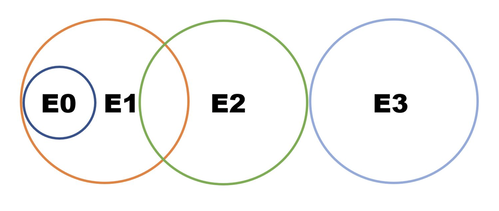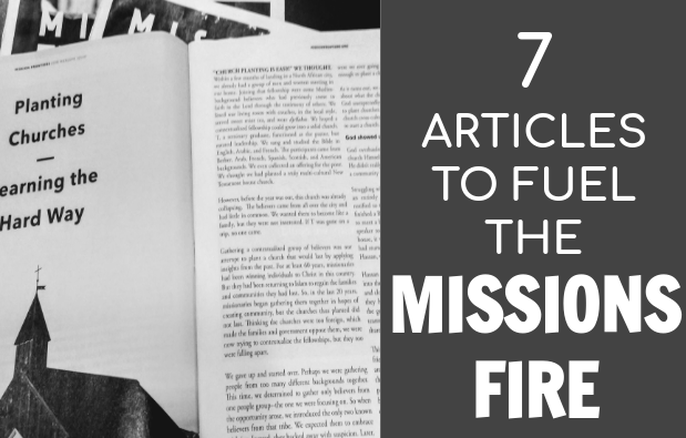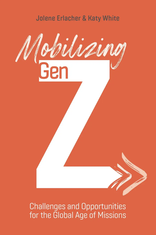|
It was several years ago that I wrote about a ministry tool called the E-Scale. Used mostly in cross-cultural contexts, “The E-Scale helps compare the cultural distances that Christians need to move in order to communicate the gospel with others. E-0 refers to evangelism of church-going Christians. E-1 extends to the very same culture through one barrier, that of “church culture.” E-2 evangelism presses into a close, but still different, culture. E-3 evangelism pushes to very different cultures.”(1) The basic idea is that the closer a person is culturally to the people they are trying to reach, the fewer the barriers there are to overcome. Sharing with an old high school friend has few barriers for communication. Moving to a Central Asian village presents a profusion of barriers to overcome; language will need to be mastered, worldview will need to be understood, customs, history, and more will need to be learned and applied to the sharing of the gospel. The relative cultural distance in this setting is immense compared to talking with an old high school buddy. On the E-scale, a high school friend is E1 where new acquaintances in Central Asia are an E-3. Missiologists and missionaries alike have discovered the importance of partnering well with national churches and near culture churches in seeing the Gospel introduced into frontier mission fields. Investing deeply in the discipleship of believers who already know the language or who grew up in a culture that was more similar to the target people group than the western missionaries then becomes an important strategic work in frontier missions by reducing barriers to communication. Some have called this “near-culture missions” which The East West Center for Missions Research and Development defines as “reaching unreached people groups through sending missionaries from geographically, culturally, and linguistically proximate people groups. This has also been referred to as proximate missions.”(2) The more we can harness the innate skills and gifts of local believers to share the gospel the more often the gospel will be shared clearly and understandably. Near-culture missions is an important strategic opportunity that the global church has been embracing. Reading a new book, Mobilizing Gen Z: Challenges and Opportunities for the Global Age of Missions by Jolene Erlacher and Katy White, I’ve begun to re-evaluate what it means to be ‘near-culture.(3)” It started with a statement from a training document for Steiger International, a ministry focused on reaching urban youth around the world.(4) The current urban generation, connected by consumerism, social media and the entertainment industry, forms the largest global culture to ever exist. It spans the globe, sharing the same values, listening to the same music, watching the same movies and sharing the same posts. This global culture is largely influenced by one predominant worldview: Secular Humanism—God is irrelevant and man is at the center. In this relativistic culture, we are god and consumerism is our religion. Many have called Gen Z digital natives. Born between 1995 and 2010, the first of Gen Z were twelve years old when the iPhone was introduced in 2007. As a generation, most did not choose to have smartphones, their parents simply bought them for them. Embracing them fully however, they have come and are coming through their teenage years with 24/7 access to the internet and social media. While the mental health results of this has been nothing short of devastating,(5) it is clear that they are more connected globally than any previous generation. It has been said that a ten year old in Omaha could very well have as much in common with a ten year old in Rome or Rio or Riyadh than with their own grandparents. And so if it is true that Gen Z is the largest global culture to ever exist, then Erlacher and White are on to something important when they say, “Given the trends in shared perspectives and values of young people across cultures, Generation Z possesses a unique opportunity. An understanding of generational views in one cultural context may equip them to engage young people more effectively in other contexts.” Could Gen Z Christians be near-culture missionaries to Gen Z Muslims, Hindus, Buddhist and atheist Chinese around the world? I’m not sure they are waiting to find out. Last year I had a zoom call with a fifteen year old in Dallas who was leading discovery Bible studies with teens from different religious backgrounds from all across the globe on Discord, a social media platform used by the online gamer community. My daughter is connected with friends in France, Turkey and the UAE. No one mobilized them to go, they were already there. For all the challenges that Gen Z faces, I am excited to see where they will lead us in the work of completing the great commission. We certainly need to continue to focus on equipping near-culture Christians living inside the 10/40 window, but might it be that Gen Z believers who are already connected with Gen Z friends inside the unreached nations of the earth will be the next powerful force in kingdom expansion. Perhaps we need to focus less on getting them to go as we went, and rather on developing disciples who love God and love others and have a heart for making disciples wherever they are . . . because for many, they are already there. 1. Missionary statesman Ralph Winter and Bruce Koch wrote “Finishing the Task: The Unreached Peoples Challenge” in which they shared the idea of the E-Scale and how to apply it to missionary strategy. This was published in an eleven page article in the Winter 2002 issue of the International Journal of Frontier Missions.
2. THE BRIDGES OF GOD: Exploring the Strategic Significance of Near-Cultural Mission. This is an extensive article written by David Bogosian filled with clear definitions and examples from both the Bible and modern day missions efforts. Accessed Nov. 22, 2023 (http://ewcenter.org/?p=8786). 3. Erlacher, Jolene; White, Katy. Mobilizing Gen Z : Challenges and Opportunities for the Global Age of Missions. William Carey Publishing. Kindle Edition. 4. Steiger International website, “Is There More?,” downloadable PDF, 9. 5. It is beyond argument that giving pre-teens and teens smart phones and social media right as they are navigating what we all know as the most difficult time of our lives - junior high - has had devastating results on the mental health and overall quality of life for Gen Z. Jonathan Haidt writes about these issues at his Substack, After Babel. See also the Varkey Foundations global study of the general health and well being of Gen Z. Through over 20,000 surveys from 20 different countries there is a wealth of information in their report which you can read HERE.
0 Comments
Historians estimate that the population of Christians in the Roman empire was 7,500 in 100 A.D. From there, rapid growth ensued so that 150 years later the population of Christians surpassed 1 million and a hundred years beyond that, in 350 A.D. the population had exploded to 34 million so that over 50% of the population of the Roman Empire claimed Christ as Lord.1 How did such substantial and rapid growth occur in a context so opposed to the Christian message? Michael Green, in his book Evangelism in the Early Church says that “The very disciples themselves were, significantly, laymen, devoid of formal theological training. Christianity was from its inception a lay movement, and so it continued for a remarkably long time. This must often have been not formal preaching, but informal chattering to friends and chance acquaintances, in homes and wine shops, on walks, and around market stalls. They went everywhere gossiping the gospel; they did it naturally, enthusiastically, and with the conviction of those who are not paid to say that sort of thing.”2 We see the first example of this kind of lay-led expansion in Acts 8:4 where those fleeing the growing persecution in Jerusalem after Stephen’s death “were scattered everywhere, and in every place they went, they told people the Good News.” Through the work of these amateur missionaries, the church in Antioch is planted. Later in Acts we see a similar pattern. In Acts 19, Paul has come to Ephesus where, after once again being rejected in the local synagogue, he moves to the lecture hall of Tyrannus where he hosts daily discussions. Luke records that “This went on for two years, so that all the Jews and Greeks who lived in the province of Asia heard the word of the Lord (v. 10, emphasis added).” While Paul plays a crucial catalytic teaching and training role, the fact that Luke so confidently records that everyone in the province of Asia heard the word of the Lord points to what Green identifies as the “informal chattering to friends and chance acquaintances, in homes and wine shops, on walks, and around market stalls.” Regular Christians gossiped the gospel wherever they found themselves. Missiologist Doug Birdsall reminds us that, “The Great Commission is for every church in every culture in every generation. There are no exclusions. But . . . every church in every culture in every generation must determine the way in which they respond to this responsibility -- in a way that is appropriate to time and context.”3 Like the early church, in order for the great commission to be completed, the whole church - missionary and layman alike - must have vision to be involved in the work God is doing among the nations and have appropriate and accessible opportunities to do so. As a stay at home mom, Sarah is a great example of this kind of vision. Sarah is thirty eight, the mother and homeschool teacher of six rambunctious kids and busy with all that life has for her and her family. She and her husband live in a small town in Michigan about an hour and a half from Detroit. They have a good life. Sarah however has always had a heart for the nations and a desire to see Muslims have an opportunity to hear and respond to the gospel. She serves on her church’s missions committee and they support several missionaries serving inside the 10/40 window. Sarah however has had a deep longing to do more and so when she heard about Embassy, a program that helps Christians connect with Muslims online, she jumped at the opportunity to join.4 After an initial orientation and training, she quickly made her first friend, a young lady from Pakistan whom she met on a secular language exchange app. Fatima, her new friend, was looking for a native English speaker to practice English with but she was also looking for friendship. The two began messaging several times a week and talked via video chat every Tuesday morning at 8 am. Over the course of the next two years, Sarah became a sort of auntie to Fatima. Her attempts at spiritual conversations however were almost always met with cold rejection. That all changed in March of 2020. The pandemic was just beginning to shut down the world and Fatima began to descend into a spiral of despair and insomnia. On their regular Tuesday morning call as twenty one year old Fatima unloaded all her worries and fears, Sarah offered to pray. For the first time, Fatima said yes. There on the video call Sarah prayed for the despair to go away, for a good night sleep and she prayed in Jesus name. She said amen and looked back up at her screen to see Fatima with tears in her eyes. Fatima wondered at Sarah’s prayer, so personal and so unlike her Islamic prayers. She commented that Sarah prayed as if she knew God, as if she expected him to listen. Sarah of course did. The next day, Sarah received a text from Fatima. “I’m about to go to sleep. Can you pray for me again? Last night I had the best night sleep I’ve had in weeks.” God was on the move and the next week, Sarah and Fatima began to read the Gospel of Luke together. Fatima began to pray to Jesus herself and a few months later, Fatima prayed with Sarah to accept Jesus as her savior. For the past 200 years, the paradigm of western missions has been to send missionaries to the places where the gospel had not yet taken root. This was the appropriate response for that time and context. In this paradigm of missions, the missionaries went and the local church partnered with them through prayer and financial support. Missionaries did their work overseas among the nations who had yet to respond to the gospel and the local church did their work back home. There was little overlap and few opportunities for a local church in the West to do anything more than pray for and send money to the missionaries they supported. We praise the Lord today that we now live in the shadow of a tremendous legacy of those faithful missionaries who went and the churches that sent them. The testimony of the rapid expansion of the Christian church in the global south reminds us of their faithfulness. Today we in the West are learning to partner with these majority world churches to continue the ministry of the great commission. We are working to determine the new ways in which we can respond to the responsibility of the great commission, in ways that are appropriate to our time and our ever changing context. It need not be noted that globalization, which is responsible for the greatest movements of peoples around the world in history, and the rise of new technology have changed the great commission context in extraordinary ways. While we surely must continue to send missionaries - and to send more - we must also work to find creative ways to respond to the new opportunities brought about by globalization and to utilize ever expanding technological developments. Much has been written to raise awareness and equip the local church to respond to the increasing opportunities to minister to the nations through the growing diasporas in our local context. We have a unique opportunity to mobilize the lay members of our churches into the harvest among Muslims, Hindus, Buddhists and others from non-Christian backgrounds who are finding their way to the West as immigrants and refugees, university students and professionals. Diaspora ministry offers for the first time an exciting opportunity for the local church to join the missionary in the work of evangelizing the least reached of our world, an opportunity that was rare even fifty years ago for most members of a local church. This is the appropriate response to globalization and the migration trends of the nations. Globalization has been driven in many ways by the technological advances in communications and computing that have taken place in the last century. The Apostle Paul watched legions of soldiers traveling across the Roman empire on a newly built and innovative system of roads. These soldiers were on their way to subjugate nations and oppress people but as he watched those soldiers march past, Paul saw the potential for those very same roads to carry the gospel all across that same empire. The printing press, radio, television and movies were all at one time new innovations that Christians quickly began using for kingdom purposes. The Internet and smartphones are the same. Missionaries and their sending agencies have quickly begun to utilize social media and online marketing strategies to sow the gospel all across the world. These media to movement strategies place simple gospel ads on the smartphones of tens of thousands in unreached nations. Systems of response allow for instant interaction with followers of Christ who can answer questions and send gospel resources to seekers and when the time comes, to connect them with a local Christian. The ability to sow the gospel abundantly has never been more achievable. An analogy that has helped me understand the media to movement ministry strategy is the picture of a lighthouse. If we imagine the unreached people of the world as individuals sitting in row boats in great seas of their own people groups and geographical regions, with a social media outreach strategy we can shine a great light into that people group or region. Most will inevitably ignore the light. But for those who have been seeking the truth and asking questions about faith, they will see the light and begin to row toward it suspecting that the answers to their questions can be found there. This all happens of course in the privacy of their own online interactions. The story of Sarah above highlights another opportunity that has received much less attention. Most of the members of our local churches in the English speaking West do not have the technical or linguistic expertise to be a part of media to movements strategies. Like it has for Sarah however, technology has created openings for everyone in the local church who loves Jesus and has an Internet connection to travel into the digital neighborhoods where the least reached of the world are gathering and there, to build relationships, demonstrate the love of Jesus and share the good news of the Kingdom. These opportunities are simple and accessible. If we go back to our analogy, the lighthouse is a powerful tool to sow the gospel abundantly but the lighthouse requires a significant level of technological expertise. We absolutely need to raise up more with these skills and to do a better job of identifying those in our local churches who already have them and inviting them to partner with the cross cultural missionaries who are working to develop media to movement strategies. We need more lighthouses. But there is also Sarah. Sarah isn’t able to run a lighthouse. But what Sarah is able to do is to step into a small rowboat, row out into that great sea of unreached peoples and bump into a rowboat containing someone who speaks her language and who is looking for friendship. By mobilizing the lay members of our local churches into their own row boats and sending them out, more Muslims, Hindus, Buddhists and people from other religious backgrounds will for the first time be connected with a true follower of Jesus. They will for the first time be the recipients of specific prayers for them and their family. They will for the first time be able to read and interact with the living and active word of God. If those things can happen we have created a tremendous opportunity for the Holy Spirit to move. The goal of mobilizing the laity of the church into online outreach ministry is of course that more people in places where there is little or no gospel witness will hear the gospel. There are however other ways that God moves through these opportunities. As I’ve led Embassy, a ministry at Crescent Project that mobilizes people like Sarah into online outreach among Muslims over the past five years I’ve seen a number of exciting side benefits.5 Our volunteers tend to become champions for Muslim ministry in their local context. They talk with friends, small groups and Sunday school classes about what they are doing and others wonder if they too could be used by God to impact the life of a Muslim living in the Muslim majority world. Our volunteers also talk a lot about the ways they have grown in their own faith as they’ve stepped out to build relationships with Muslims who believe very differently from any of their friends. When our Muslim friend scoffs at the idea of a Triune God as utterly heretical, it forces us to dig into the word of God, to pray more and to seek wise counsel. Most would say that joining our ministry has caused them to mature in their faith. Another reality is that many of our volunteers tell of how their online outreach has acted as a sort of training for their hearts to be more bold in reaching out locally. We have also had several of our volunteers move on from online outreach to actually going as missionaries to the Muslim world. Some joined us to prepare for their upcoming move. Others began to sense a new call to missions after they began interacting with Muslims online. And finally, when the lay members of our churches begin reaching out online, it creates a greater connection to the missionaries their churches are sending. My family and I served in Central Asia for a number of years and our small rural church loved and supported us in amazing ways. But we never really sensed in our church a deep heart for the Muslim people we were living among. Imagine how that might have changed had there been five or ten members who were connecting with people from our same country, building relationships with them, praying for them and seeking opportunities to share the good news of Jesus with them. The nature of the relationship would have moved toward a fuller expression of partnership in the ministry as they asked the congregation to be praying for their Muslim friends and inevitably asked us for training. While the list of opportunities for this kind of online outreach is long and exciting, some might push back and say that it's dangerous to turn untrained people who don’t know the language or the culture loose into online relationships with people living in the 10/40 window. To this I’d first say that our ministry does give initial and ongoing training to our volunteers. It is not as in-depth as a missionary sending agency and few of them are learning the language; they are connecting with English language learners. Furthermore, this objection assumes a neutral reality but the digital world is far from neutral. I recently did a search on a common language exchange app that our volunteers use to make connections. I searched for Arabic speakers living in Algeria between the ages of eighteen and twenty two. I quickly found over 200 Algerians who had signed onto the site in just the last day looking for connections to a native English speaking friend. They will connect with someone. It may be a secular humanist or a radical atheist, a new age religionist or a jihadist but they will make connections online. Our hope is that more and more of them will connect with a follower of Jesus. Mobilizing the members of our local church is in no way going to replace the work of the professional missionary. Indeed, we need to send more missionaries. But these kinds of missional opportunities can be another spoke on the wheel of outreach among the unreached, ensuring that a few more will have an opportunity to hear and respond to the gospel. Jack is a great example of this kind of work. He is fifteen and loves video games. He also loves Jesus and as he was interacting on Discord, the instant messaging app favored by gamers, he began to realize that he was interacting with people from all over the world, many of them from the Muslim, Hindu and Buddhist worlds. He soon began to share about his faith and invite people into discovery Bible studies. Rita is seventy two, retired and joined our online ministry because she was convicted by the question, “Am I going to crochet my way to heaven?” She volunteered with us and on our orientation call, I was able to open up Facebook, search for “crochet Pakistan '' and we discovered four private groups of women who love to share their pictures of the handiwork they have created and to interact online. Rita asked to join one of the groups and was quickly welcomed by these Pakistani Muslim women, most of whom spoke some English. She was the first follower of Christ any of them had ever met. The opportunities for online outreach are nearly unlimited and they are available to the members of our local churches. Because of this, we in the mission community have a unique chance to invite our local churches into the harvest among the unreached in ways that have never before existed. In doing this, we can help ordinary followers of Christ find their way into the extraordinary work of God among the unreached. Endnotes 1. Stark, Rodney. The Rise of Christianity. HarperSanFrancisco; unknown edition, 1997. 1. Green, Michael. Evangelism in the Early Church. W.B. Eerdmans Pub., 2004. 3. Borthwick, Paul. Western Christians in Global Mission: What's the Role of the North American Church? IVP Books, 2012. 4. Embassy is a ministry of Crescent Project and mobilizes followers of Christ into the harvest among Muslims online. Learn more at: https://www.crescentproject.org/embassy 5. Crescent Project’s mission is to give every Muslim the opportunity to respond to the gospel and be connected with a follower of Christ. Embassy is just one of many of the ways they are working to complete this mission. Learn more at: https://www.crescentproject.org/ If you found this article helpful, please take a moment to share it with a few friends. Thanks so much!  Sometimes you need a book that, through reading a chapter a day, you receive encouragement in your faith. Fear Not: Living a Life of No Regrets was just that book for me this past summer. Author James Cha weaves captivating stories, Biblical truth and a lifetime of wisdom into this great devotional. James and his wife Faith spent over a decade serving the Lord in Central Asia, saw more than 120 Muslims come to faith in Christ and experienced their own share of persecution. It is because of these experiences and James' deep knowledge of the Bible that Fear Not is an excellent resources for any believer wanting to grow in their faith. It will be an especially helpful resources for any interested in moving to the Muslim world to serve the Lord. The book covers a myriad of topics all of which work toward helping the reader to respond to the call of Christ in obedience and surrender. It was incredibly encouraging, filled with exhortation and I would recommend it to anyone who wants to grow closer to Christ and learn to be a more active participant in His kingdom mission. Fear Not: Living a Life of No Regrets *Links to book are affiliate links. When Jesus told his disciples in Luke 10:2 that the harvest is plentiful but the workers are few he was making a statement of fact. His encouragement was to pray for more harvesters and when he later delivered the great commission in Matthew 28, the marching orders for followers of Christ and his church became clear: Jesus came to seek and save the lost and his plan to accomplish the task was built on the development of disciples who make disciples. Out of this disciple making milieu churches naturally form. God gets the glory and the kingdom of Jesus expands. The simple creed, to know God and make him known, stands as a summary of the message of the Bible and the life purpose of any Christian. As we cast our gaze back through church history we see the story of a church stumbling forward in this endeavor, sometimes embracing it wholeheartedly, sometimes distracted and faltering, sometimes accomplishing it through the divine push of the Spirit of God. The very first generation of Christians was laser focused on making disciples. They proclaimed the gospel boldly and God added to their numbers steadily (Acts 2:41, 47; 5:14, 42; 6:7). Outside of Philip however, few ventured beyond the walls of Jerusalem. And then, with the martyrdom of Stephen, God seems to have given His church a divine push and a ragtag collection of relatively new Christians soon scattered across the refugee road and “preached the word wherever they went” (Acts 8:4). The church, a family of ordinary, unschooled men and women living on the fringe of society, turned the Roman world upside down. Each successive generation has had to discover their own role in obeying the great commission. At times the church has remained true to the core missionary task and at other times the church has turned inward, succumbed to the distracting lure of political power or simply capitulated to the ways of the world. Always there was a remnant and that remnant continued to follow Jesus into the harvest among those who had not yet heard. As the world grew and changed, the church adapted with it. New technologies and innovations opened up new opportunities to carry the gospel forward. The printing press allowed for the mass printing of Bibles and gospel tracts. The steam engine carried missionaries further, faster. The radio opened up the door to broadcasting the good news into the places Christian workers weren’t allowed. Missiologist Doug Birdsall observed that, “The Great Commission is for every church in every culture in every generation. There are no exclusions. But . . . every church in every culture in every generation must determine the way in which they respond to this responsibility -- in a way that is appropriate to time and context.” Philip the Evangelist thought about his role in completing the great commission in completely different ways than Hudson Taylor did 1800 years later when he boarded a ship to China. And when Jim Elliot and Nate Saint dropped a bucket on a string out of a circling plane over the Amazon jungle they too innovated in order to take the gospel forward. Today our world has changed in extraordinary ways. Globalization has led to the migrations of people across the globe in unprecedented numbers and now people groups once hidden in far away lands are living down the street. Technology has opened up doors of communication that never before existed. Where the printing press gave rise to the gospel tract, the internet has opened doors to place gospel messages on the smartphones in the hands of men and women who have never met a follower of Christ. We can all agree that the Internet is a double edged sword carrying in its networks unimaginable power for both good and evil. And yet our redeemer God has led His church to utilize this new technology for His glory and the expansion of His kingdom. Mission agencies around the world are using social media marketing tools in order to connect with the hidden seekers scattered throughout every region, people group and religion. One group serving in a Muslim majority country saw all in person connections shut down because of Covid in early 2020. After catching their breath and mourning the loss of ministry as they knew it, they began to run Facebook ads throughout the region. Within a few months they had engaged in more gospel conversations and seen more people come to faith than in the previous years they’d been in the country. Two young teenage girls who had been secret believers for over a year responded to one of those ads and for the first time were connected with other followers of Christ. But it’s not only missionaries and professionals who are able to do this kind of work. Today, with a little coaching and some simple training, any follower of Christ with an Internet connection can begin building relationships with the unreached in the Muslim, Hindu, Buddhist and tribal worlds – the church unleashed into the global harvest, partnering in the great commission as never before, being the answer to Jesus’ prayer for more harvesters. A retired teacher in a small town in the Midwest heard about Crescent Project and the Embassy ministry and was soon connecting with English teachers through a Facebook group for teachers in the Middle East. She now regularly texts and calls with a handful of new friends - all of them are Muslim. She is the first true Christian any of them has met and she is praying for them daily, sharing regular testimonies of God’s faithfulness and, with two of these dear teachers, they have begun reading the Bible together. A college student in London was watching a live soccer match on Youtube when he noticed that many of the people adding comments on the live chat were Hindi names. He began to interact and was able to connect with two new Hindu friends from East Asia - in a live chat on Youtube while watching a soccer match. Who knows where God will lead these young men as they begin to ask questions and hear about the good news from a twenty year old Brit. Another Embassy volunteer was pleasantly surprised to find out that the young Iranian woman with whom she’d connected on a language learning app had recently become a Christian. A sister in Christ from Brazil had already been connecting with her, shared the gospel and led her to faith. In what the Embassy volunteer would say was one of the most powerful zoom calls of her life, these three sisters gathered together to share testimonies, read the Bible, worship and pray together. God is on the move. He has always been on the move and has never missed an opportunity to redeem new technologies and innovations. Over 5 billion people in the world, if asked today, would say that they are not a Christian. 3.3 billion of those are a part of unreached people groups, ethnic groups without an indigenous, self-propagating Christian church. Many of them have never met a follower of Christ, have never read a Bible and have never been in a church. We must continue to raise up and send missionaries into these least reached regions of our planet - we must do so and we must send more. But for those of us who are not going, we too can be a part of Christ’s harvest force. It will take a tenacious curiosity and teamwork and the expertise of those among us familiar with these new technologies. More than anything, like always, we’ll need to be faithful. Faithful like the two dear sisters who are vision impaired who have joined the Embassy team. Faithful like the many seventy and eighty year olds and the university students who are reaching out online and meeting Muslims. They too are a part of the Embassy ministry. At Crescent Project, we would love to give you the training and the onramps to begin to reach out, connect with and share the love of Jesus with Muslims. There are other great organizations who can help you get started as well. The harvest is plentiful but the workers are few - join with me in praying for the Lord of the Harvest to send workers into those harvest fields. Organizations that can help you get started reaching out online: World Christians are (in Corrie Ten Boom’s phrase) “tramps for the Lord” who have left their hiding places to roam the Gap with the Savior. They are heaven’s expatriates, camping where the kingdom is best served. They are earth’s dispossessed, who’ve journeyed forth to give a dying world not only the Gospel but their own souls as well. They are members of God’s global dispersion down through history and out through the nations, reaching the unreached and blessing the families of earth. Do you want to be a "tramp for the Lord"? Do you want to roam the Gap with the savior? Do you want to journey fourth to give a dying world the good news of Jesus? Start by reading David Bryant's article, To Be A World Christian. Contact Us and we'll work to encourage and equip to you go into the harvest, locally, regionally and globally. I remember growing up, my grandmother would tell stories of the waning days of the Great Depression and the first years of World War II. I was captivated by the way she and the whole country seemed to respond to the crisis of war and depression. She told stories not only of the young men who willingly signed up to defend freedom but also of the ways those who stayed behind stepped up to serve, sacrificially rationing and growing gardens and doing anything they could to support the war effort. Those stories left a longing in me to live a purposeful life of sacrifice and meaning. The Covid-19 pandemic is our crisis. For many of us, we are looking for purposeful ways to respond. Somehow, “stay at home and watch Netflix” just doesn’t seem all that meaningful, even though we know it is the best thing to do (at least the stay at home part). As followers of Christ then, what are the ways we can respond that are meaningful and in partnership with the mission of God. Nearly six billion people in our world do not yet call themselves Christians and over two billion don’t even have access to an opportunity to hear the gospel. Here are five different ways you can be a part of God’s global mission, even as you stay at home. LEARN As the global pause button continues to be depressed, take the extra time you have to learn more about God’s mission and how you can be a part of it. Here are several ideas:
ENCOURAGE Isolation and loneliness are real issues in a time of pandemic. I trust you are already doing your part to discover creative ways to encourage those in your neighborhood, your church family and your immediate family. But missionaries and our global brothers and sisters in Christ are also isolated in times like these. Here are a few ideas for encouraging them.
PRAY Too often, followers of Jesus underestimate the power of prayer. It seems that in the pandemic and the forced slowing of life, prayer would be the greatest response would could give to the Lord. Here are a number of resources to help you pray more.
GO Mission trips have been canceled, missionaries have had to return from the field and stay at home orders abound across the globe and yet the opportunity to go into the Muslim world has never been greater. Because of the Covid-19 pandemic, more people on every continent are home bound than ever in world history. They are isolated, alone, and wondering what tomorrow will hold. Hundreds of thousands of young Muslim men and women who speak English are also sheltering in their homes, smartphone in hand, surfing the Internet in search of answers, hope and friendship. What if they met you? Volunteer with Embassy and they will teach you how to connect online with Muslims in difficult to access nations. You will almost certainly be the first follower of Jesus they have ever met. Sign up for a free one hour introductory training or stop by the Embassy website to learn more. FILTER We live in a media saturated world. Messages come fast and furious from every device we own and many are wondering if we can trust any of the news we hear. How do we filter through all the nose? The reality is that we are all being discipled - being formed - by the messages that dominate our days. Because of this it is imperative that we shut off the noise and immerse ourselves in the word of God. As we do this, the word of God will increasingly become the filter through which all other messages have to pass. If the dominant source of messages in our day is our favorite right leaning or left leaning news outlet, it will become the filter, even filtering the way we read the Bible. Nobody is making you listen to the news or keep scrolling through your Facebook feed. Nobody is forcing you to not read your Bible. It’s a choice we all have to make. We have an opportunity to filter what we read, hear and see. As we do that and as we prayerfully seek God’s direction each day we will find the things we can do in this season of global pandemic and God will use us in his global purposes. It’s been a while since I’ve put together a post for the 7 Series and so today I want to share seven articles that have been a part of shaping a great commission heart in me and in thousands around the world. I’d encourage you to take some time in the coming month to read each of these articles and then pray about one or two friends at your church to whom you can send the article with an encouragement for them to read it as well. Most of these are the bread and butter articles from the Perspectives course and so while many were written a generation ago, they continue to impact the church in powerful ways. I hope they will challenge and inspire you and remember, pass them on to others.
Be sure and stop back by and share your reaction to the articles you read in the comments below. We'd love to be able to learn from one another. And share this article you love with the friends you love. It was a cold day in January of 1942. My then seventeen year old grandfather had cut class and walked down to the local draft office of his small Michigan town. With resolve and determination he walked in and requested to volunteer with the army. There was a war going on - the Pearl Harbor attack was still fresh in the minds of the country - and my grandfather wanted to do his part to end it. The gentleman behind the desk wisely sent my grandfather back to school with instructions to return after graduation in May. He did that and by early June had joined a mass of other young men at boot camp in Southern California. There he was trained as a soldier first and then as a radio operator, learning morse code and radio maintenance. He was part of the United States Army and the following fall would sail to Europe where he would be part of the liberation of France and the Buchenwald Concentration camp and of the ending of the war. My grandfather had taken his place in the story of World War 2. He had risked his life for a cause that was bigger than himself. He had joined millions of young men who felt that this war was worth any sacrifice. But it wasn’t just the young men who thought this war was worth any sacrifice. My grandmother was then sixteen, still in high school, still living at home. She and her family saw the need to sacrifice for the war effort as well. They spent their hard earned money to buy war bonds and they willingly accepted the rationing system on gasoline, coffee, sugar and other foods. She told of the day that her entire school skipped classes and drove throughout the county in large farm trucks to collect any scrap metal they could find. As they drove back into town after a hard days work, they came upon the owner of the bank. He was drenched in sweat, cutting his wrought iron fence down with a hack saw. There was a war going on and they were going to do their part to win it. Everyone had a part to play. Everyone had a sacrifice to make. Everyone had taken their place in the story. History looks back on that generation and remembers them as the greatest generation. They lived with a wartime mentality. They did not ask what they wanted or what made them happy. They simply asked what they could do to help win the war. I am forty six and my generation is often known as the “me” generation. For the most part my generation has focused on how we can be happy, on what brings us fulfillment, on how we can live the life that we want to live. World War 2 was a result of the brokenness of man and the tyranny of Satan. He is a thief who has come to lie, kill and destroy. Today there is a war going on that is cosmic in proportion and the consequences are eternal. Well over 5 billion people on earth, if asked, would say that they are not Christians. Their destination is an eternity separated from God in hell if something does not change. Over 2 billion in our world have never even had an opportunity to hear the gospel. Many of them are Muslims, trapped in a religious system that tells them that they have to earn their way to heaven. There is a war going on. It involves billions more souls than World War 2 and for all of them, eternity is at stake. There is a role for every follower of Christ in this story. Some will be soldiers on the front lines. Many more will stay home and do their part from there. But they will all be part of this greatest story. For Christians it is a question of legacies. Which legacy will we step into? Will we look at the redemptive story of scripture, at the Father’s heart and the brutal facts of lostness and decide that there is no sacrifice too great to be a part of that story? Will our legacy be like that of the greatest generation or of the me generation? As the new year approaches we all have opportunities for new beginnings. It’s a time of both reflection and of setting goals, and as we look ahead, we at E2E would like to offer 10 ways that you can invest more focus on the great commission in 2020. 1. Start The Year In The Word If you have not yet, we’d encourage you to find some time in the coming days to work through the Father’s Heart Bible study. It will help you to discover the desires of God for the nations. N.T. Wright reminds us that, "Mission is not something added on to 'biblical theology.'...The story of Scripture, focused in the Gospel events concerning Jesus, is about mission from start to finish." Here are a few other studies and resources that will help you immerse yourself in God’s word to begin the new year:
2. Start The Year In Prayer Prayer is the foundation of every move of God. When we pray, God begins to shape our hearts toward those things that we are praying for and so if you want your heart to grow in its commitment to the great commission, to the mission of God, then prayer is one way to do that. Here are a number of resources that will help you pray more for the nations and God’s mission:
3. Subscribe to a Podcast Listening to interviews, missiologists, on the ground practitioners and prayer warriors on podcasts is an easy way to fuel your missions focus. Subscribing to a podcast or two ensures a regular dose of great commission inspiration. 4. Eat Out with Friends One simple way to both enjoy time with friends or family and inspire a heart for the great commission is to eat out at ethnic restaurants. Not Taco Bell or Panda Express but a restaurant owned and operated by an immigrant family.
5. Watch a Movie Movies are a great way to spend time with friends and family and can also be a great tool for inspiring and motivating people towards a great commission focused lifestyle. Watch one of these movies at home or gather a group from your church for a movie night.
6. Read a Good Missions Book Books are a great way to dive into the story of God’s mission to redeem the lost to himself. They are great gifts as well and so make sure you are both reading and passing along books to others. Here are a few lists of books to get you started: 7. Buy a World Map Visual reminders of the world that God created and that we live in help us remember to pray for the unreached. Consider buying a world map to help keep you focused and inspired. Here are a few creative ideas: 8. Write an Encouraging Letter to a Missionary As someone who lived cross culturally, there is little that brings more encouragement than a hand written letter from a friend or supporter. Do you support a missionary? Get their mailing address and send them a letter in the mail. 9. Give a Beginning of the Year Gift rather than an End of the Year Gift Many end the year with a little extra end of the year financial gift to missionaries or mission agencies and that is amazing and super helpful for those raising full time support. But what would it look like if you started your year by giving an extra financial gift of blessing. It seems it might focus the trajectory of your heart and your year! And it would be a huge blessing to the missionaries you support. 10. Commit to serving Locally, Nationally and Globally Most mission trips - whether they be local, national or international trips - take a fair amount of planning and preparation. Commit now to taking a trip this year! Here are a few organizations and trips worth considering:
As with any endeavor - if we want to grow - we have to invest. We have to invest time, energy, effort, thought and often, finances and when we do we find ourselves becoming the thing we wish to become. It is no different with developing a life shaped by and living for the great commission. Take steps today to shape your life around the fulfillment of the great commission! It was 2008 when our family moved to a Central Asia. We were settling into life there, learning the local language and enjoying the adventure of new beginnings and new experiences. At the end of our first November however we began to encounter an eerie silence. We lived in one the world’s largest cities, bustling with noise and commotion and yet we could not avoid this silence. It was a Christmas silence. This nation was over 99% Muslim and as we went about the dailiness of life, there were no discernible signs that the Christmas season was upon us: no Christmas music in stores, no lights, no Christmas trees, no manger scenes - nothing. The silence became for us an ever present reminder that the light of Christ had yet to shine in that land - for most, the light of Christ had yet to be seen. It was in that season of silence that we began to discover four attitudes, born in the Advent traditions of the church, that would help us fix our eyes on Jesus and live with intentionality for his glory. Lament If we look into the silence, the darkness and brokenness, we see that the prince of this world always fights to preserve the darkness. Satan is a tyrant unmatched in all history. He is the enemy of God and thus, he is all humanity’s enemy. Wherever the light of Jesus is pushing into places of darkness, he will oppose it. In much of our world that opposition comes in the form of brutal oppression and violence. At Jesus’ birth, he fought back through King Herod. Today it may be an oppressive government or violently radical religious groups. But Satan doesn’t always use violence and brutality. Deception works just the same. He takes the truth of a Creator God, twists it and binds 1.7 billion Muslims in a false religion. He pawns pantheism and paganism and atheism and materialism as paths to a good life. The pursuit of the American dream works just as well for him as the ideological brainwashing of an atheistic Chinese regime. The first coming of Christ has happened. 2,000 years ago Jesus was born as a baby, lived a perfect life and died for the sins of the world. Satan was defeated at the cross and the light of life is available to all who call on the name of Jesus to be saved. The second coming of Christ WILL happen. He will come again. He will make all things new. Satan will be cast into the pit and sin and death will be no more. In the interim however, 5.4 billion people in our world are not experiencing the abundant life of Jesus. 2.2 billion live in places with no access to the gospel. But it's not just those tied up in false religions. It’s right here in our Christmas saturated society as well. A recent article in the Washington Post wrote about the fact that the average lifespan of Americans has fallen for the first time in decades. It’s fallen not because older people aren’t living as long, it’s falling because of the drastic increase of mid life deaths of 20, 30 and 40 year olds. One researcher said, “There is something more fundamental about how people are feeling at some level – whether it’s economic, whether it’s stress, whether it’s deterioration of family. People are feeling worse about themselves and their futures, and it’s leading them to do things that are self destructive and not promoting health.” Our world is a broken place. The thief comes to steal and kill and to destroy. That’s the bad news. Tish Harrison Warren recently wrote that “To practice Advent is to lean into an almost cosmic ache: our deep, wordless desire for things to be made right and the incompleteness we find in the meantime. We dwell in a world still racked with conflict, violence, suffering, darkness.” Lament is our appropriate response. It’s not the way things are supposed to be. It breaks the Father’s heart and it should break ours. Expectation We move from lament to expectation because that is not the end of the story. Jesus was born. Harrod Failed. The true light which gives light to everyone has come into the world. Satan has been defeated. In Matthew 24:14 Jesus told his disciples that "this gospel of the kingdom will be preached throughout the whole world as a testimony to all nations and then the end will come." And we know this will happen because when John is given a peak into the future reality of heaven in Revelation 7:9 he says, “After this I looked, and behold, a great multitude that no one could number from every nation, from all tribes and peoples and languages, standing before the throne and before the Lamb, clothed in white robes with palm branches in their hands and crying out in a loud voice, “Salvation belongs to our God who sits on the throne, and to the Lamb.” Jesus is true to his word. Celebration And as we move from Expectation to Celebration, it truly is the time to sing Joy to the world, the Lord has come! Like the wisemen, we sacrifice time and resources to come to Jesus and when we see him theirs is the only right response – to fall down and worship! We’ve been saved. We’ve been adopted into His family. We’ve been set free and made new and can live the abundant life of Jesus and we will reign forever with him in heaven. More Muslims have come to faith in Christ in the last 15 years than in the previous 1400 years combined. The fastest growing church in the world today is in Iran. Syrians are coming to faith faster than Christians in Europe can handle and it’s bringing revival to the church there. Because Jesus said that the harvest is plentiful, we live in eager anticipation of others experiencing the same gift of salvation that we have experienced. Lament. Expectation. Celebration. It’s an advent pattern that we discovered could help us keep our focus on Christ during Christmas. Mission And so as we fix our eyes on Jesus this Advent season, let us fix our hearts on the things that his heart is fixed on, on the reason that he came. Ever since Genesis 3, everything in scripture – everything in the cosmos - was pointing to the moment in time when God would send his son into our broken and dark world in order to reconcile all things to himself. The Bible is the story of rescue. Of mission. And so to this advent pattern of Lament, Expectation, and Celebration it is important to also add Mission. Our appropriate response to Jesus, who came to seek and save the lost, is to join him on his mission. He is the light of the world and he called us to be light to the world as well; we are not to hide our light. He was sent into this dark and broken world and he says, as I was sent, so I send you. He leaves the ninety-nine to go after the one. He sweeps the house clean to find the lost coin and his last command to his disciples and to us was to go into all the world and make disciples, baptizing them in the name of the father and the son and the holy spirit and teaching them to obey everything that he had commanded. Christmas is the celebration of the mission of God. The God of the Universe loved us so much that he sent his one and only son, that whoever believes in him shall not perish but have eternal life. That’s why Jesus came. That’s why we have Christmas. Lament. Expectation. Celebration. Mission. Let us fix our eyes on Jesus – mindful of the brokenness and darkness of this world – but filled with hope because the light shines in the darkness and the darkness has not overcome it. As we do that, commit to taking some time to ask the Lord what he might want the next few weeks to look like for you and for your family. He might just say, Stay the Course. He might invite you into life altering changes, into a new journey of risk taking obedience to the King. Lament. Expectation. Celebration. Mission. This article is taken from a sermon preached for Advent. You can listen HERE (20 minutes). |
The E2E Community
Categories
All
Good Books
Archives
April 2024
|
Proudly powered by Weebly
















